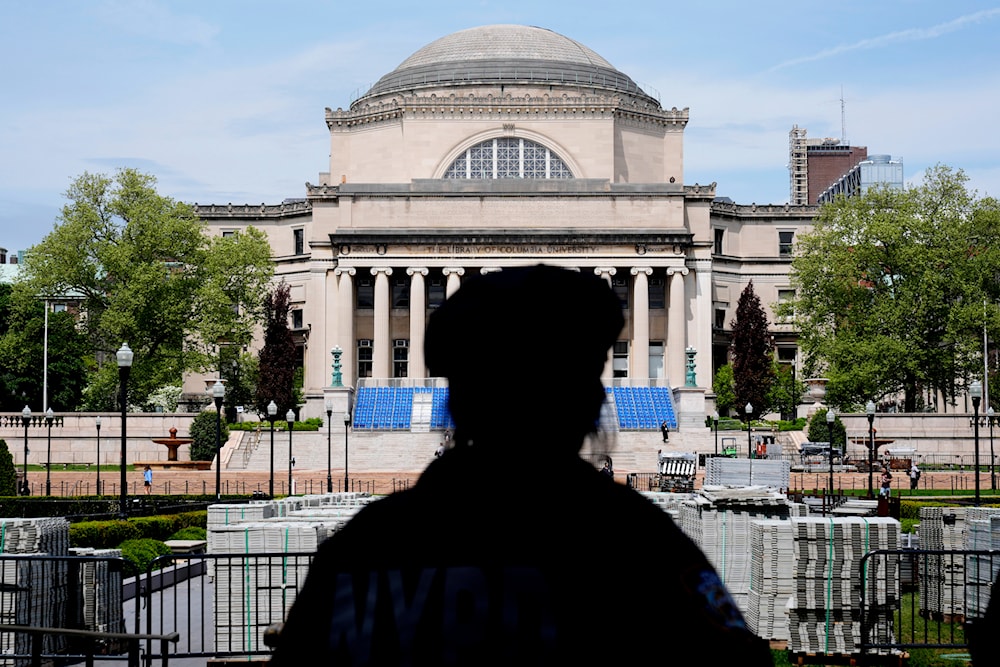Columbia faculty members pass no-confidence vote against president
The faculty members of Columbia University pass a no-confidence vote against the university's president in light of growing disapproval of her response to the student protests.
-

A New York City police officer looks over the center of Columbia University, in New York, May 6, 2024 (AP)
Faculty members of Columbia University's School of Arts and Sciences passed a motion of "no confidence" against President Minouche Shafik on Thursday over her response to the student protesters demanding an end to the bloodshed in Gaza.
Of the 709 faculty members who participated in the vote, 65% supported the no-confidence motion. The motion was put forward by faculty members on the board of Columbia’s chapter of the American Association of University Professors. According to The Washington Post, 29% voted against the motion, while 6% abstained.
The faculty's dissatisfaction is over Shafik’s decision to involve the New York Police Department (NYPD) in dismantling a pro-Palestine protest encampment on university grounds through violent means without prior consultation with the university senate.
"The President’s choices to ignore our statutes and our norms of academic freedom and shared governance, to have our students arrested, and to impose a lockdown of our campus with continuing police presence, have gravely undermined our confidence in her," the motion stated.
"A vote of no confidence in the President is the first step towards rebuilding our community and reestablishing the University’s core values of free speech, the right to peaceful assembly, and shared governance."
It should be noted that the Arts and Sciences faculty represents just 20% of Columbia's 4,600 full-time faculty members. As university spokesman Ben Chang highlighted, the no-confidence vote is symbolic and holds no legal authority, though it shows the growing dissatisfaction with the erosion of the students' rights to assembly.
Amy Hungerford, dean of Arts and Sciences, acknowledged the vote as a reflection of the frustration and disappointment felt by many faculty members.
The issue peaked on April 18 when NYPD officers, summoned by Shafik, arrested 108 pro-Palestine protesters during the Gaza Solidarity Encampment.
The encampment had persisted for more than 30 hours before police intervention. Officers in riot gear stormed the campuses and proceeded to detain the protesters, two of whom faced additional charges of obstruction of governmental administration.
Shortly after, outraged by the footage of their fellow students being arrested, a new group of students arrived on campus and set up another encampment in protest.
Panel against suppression of protests
The President of Columbia University faced increased pressure in late April as a campus oversight committee strongly condemned her administration's actions in suppressing a pro-Palestine demonstration in the school.
Universities across the United States have witnessed in the past few weeks a historic surge in student protests in support of Palestine and Gaza, calling for ending all agreements with "Israel" and divesting from the occupation entity. Students also demanded an end to the US support to "Israel" and involvement in the genocidal war.
Shafik had issued an ultimatum to student protesters: either negotiate an agreement with the administration to disband the encampment or the school would pursue alternative measures to dismantle it. However, the demonstrators remained steadfast in their demands, with new supporters swelling their ranks.
The Columbia University Senate passed a resolution stating that Shafik's administration had eroded academic freedom and disregarded the privacy and due process rights of students and faculty members by involving the police and terminating the protest.
"The decision... has raised serious concerns about the administration's respect for shared governance and transparency in the university decision-making process," it said.
The Senate, predominantly comprising faculty members and other staff with a minority representation of students, refrained from explicitly mentioning Shafik in its resolution and opted for a less severe tone than a censure. The president, also a member of the Senate, did not attend.

 4 Min Read
4 Min Read








